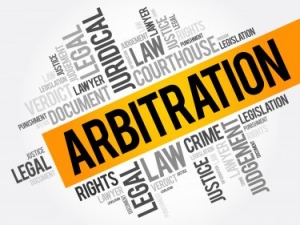Important Reminder for Home Improvement Contractors in Pennsylvania
In 2008, Pennsylvania enacted the Home Improvement Consumer Protection Act (HICPA) designed to protect home owners from unscrupulous contractors. However, it is also a trap for the unwary home improvement contractors. In addition to its registration requirements, HICPA specifies what must be in a contract for home improvement services and what may not be in these contracts.
HICPA applies not only to contractors performing renovations and remodels, but also many other types of services including most landscaping work, security systems, fencing companies and concrete work. Any individual or company performing these services needs to be aware of the requirements imposed by HICPA and can read more in this client alert.
Pennsylvania’s New Arbitration Act: What Non-Litigators Should Know
On July 1, 2019 arbitration agreements in Pennsylvania will be governed by the Revised Uniform Arbitration Act (RUAA). RUAA revises the Uniform Arbitration Act which has been in force in Pennsylvania since 1980. What should non-litigators know about RUAA?
1. Application
RUAA applies on a mandatory basis to all agreements to arbitrate signed after July 1, 2019. In addition, the parties to an arbitration agreement executed before July 1, 2019 can agree that RUAA’s provisions govern.
2. Common Law Arbitration
Since 1980, Pennsylvania has had in effect two options for arbitration. Parties could specify that their arbitration was governed by the terms of RUAA’s predecessor, the Uniform Arbitration Act. If they did not do so, governance of the arbitration defaulted to common law arbitration rules. Both the Uniform Arbitration Act and common law arbitration (despite its name) were codified in Pennsylvania’s Judicial Code. RUAA abolishes common law arbitration in Pennsylvania.
3. Impartiality of Arbitrators
RUAA includes disclosure requirements not previously found in the law. Under RUAA an arbitrator must make a reasonable inquiry to determine the existence of any facts which a reasonable person would consider likely to affect an arbitrator’s impartiality. These include a personal or financial interest in the outcome of the case, past or present relationships with the parties, their attorneys or representatives, witnesses or other appointed arbitrators. Disclosure of any such facts must be made. Failure to do so may constitute grounds to vacate any award. To preserve the right to claim partiality after disclosure, timely objection must be made and if the arbitration agreement or rules of the arbitration organization provide rules to challenge the appointment, such rules must be followed.
4. Immunity of Arbitrators
Arbitrators are afforded immunity under RUAA to the same extent that a judge, sitting in a civil action would be immune.
5. Consolidation
RUAA provides that under certain circumstances a court may order consolidation of multiple pending arbitration matters, unless the agreement prohibits such consolidation.
6. Interim Remedies
Before an arbitrator is appointed, RUAA permits the Court to enter a provisional or interim order to protect the effectiveness of the arbitration proceeding. Once appointed, an arbitrator can modify the Court’s provisional order or enter a provisional order his own. Such orders include temporary restraining orders as well as the issuance of liens and preliminary injunctions.
7. Discovery
Before RUAA, there was no guidance on the conduct of discovery other than the power granted to the arbitrator to issue subpoenas and to take testimony of witnesses who could not attend the hearing by deposition. Typically, limited discovery was conducted by agreement of the parties. RUAA makes it clear that the arbitrator can order discovery as appropriate in the circumstances and sanction a party who fails to comply with discovery requests.
8. Is a Hearing Required?
No. The arbitrator can determine that the case does not require an evidentiary hearing and if so, make a decision without holding one.
9. Attorney’s Fees, Costs and Punitive Damages
Attorney’s fees and punitive damages can be awarded to the extent that these remedies are permitted under the law in a civil action. RUAA carries forward the power granted to arbitrators under prior law to apportion the cost of the proceeding, including the fees of the arbitrators between the parties.
10. Modification and Waiver
RUAA permits waiver or modification of its provisions except for eleven provisions which cannot be waived or modified at all, and nine provisions which can be waived or modified but only after a controversy subject to arbitration arises. Examples of the former are the RUAA provisions regarding its applicability and regarding immunity of the arbitrators. Examples of the latter are the rights to seek provisional relief and the arbitrator’s disclosure provisions.
RUAA is a welcome update to Pennsylvania law. Its provisions will bring some order to a forum that, in some circumstances, was the Wild West.
Using a Special Litigation Committee to Assess Shareholder Derivative Claims
In the corporate setting, it has long been the case that a shareholder can assert a claim on behalf of the corporation when management of the entity refuses to do so – a so called derivative action. Under Pennsylvania’s limited partner statute, a partner (general or limited) can now do the same. A derivative action is one brought by a partner to assert a claim on behalf of the partnership where the general partner refuses to do so.
To bring a derivative action, unless the requirement to do so is excused, the limited partner must first make a demand that the general partner take steps to assert the partnership’s right. The demand must be in “record form” and “give notice with reasonable specificity of the essential facts relied upon to support each of the claims made in the demand.” As will be seen, it is important to carefully craft the demand, since the scope of the derivative claims that can be asserted is limited to those claims identified in the demand and because making the demand also temporarily tolls the statute of limitations on such claims.
After receipt of the demand, the general partner may choose to appoint a special litigation committee (SLC) to investigate the claims asserted in the demand and determine whether pursuing any of them is in the best interests of the partnership. The statute gives the general partner wide discretion to appoint members of the committee, so long as they are not interested in the claims and can exercise objective judgment. Indeed, other limited or general partners may be committee members.
The SLC is then charged with conducting an investigation. The scope of that investigation is limited by the claims set forth in the demand letter and is subject to the good faith requirements of the statute. Within these limitations, the investigation conducted is left to the committee.
Upon conclusion of the investigation, the SLC can make one of several recommendations authorized by the statute. These range from recommending that the claims not be brought (and if brought, discontinued) to recommending that the limited partnership itself assert them. The SLC has ultimate power over the claims as Court is bound to enforce its decision with judicial review limited to whether the members of the committee met the qualifications required under the statute and whether the committee “conducted its investigation and made its recommendation in good faith, independently and with reasonable care.”
I recently used the SLC procedure in a case involving a limited partner who owed a large sum of money to the limited partnership. The general partner authorized a claim against the limited partner to collect the balance due. The limited partner defended the case by asserting that the general partner was improperly appointed and therefore did not have authority to commence the collection action. The limited partner issued a demand for removal of the general partner under the act. I suggested that a special litigation committee be appointed. In this instance, I suggested that one committee member be a retired judge from the county in which the action was pending to defuse any argument that the SLC was not qualified or that it did not act in good faith and independently. As I represented the limited partnership, separate counsel was engaged to represent the general partner before the SLC.
In proceedings before the SLC, the limited partner’s counsel sought to expand the claims to include mismanagement and breaches of fiduciary duty alleged to have been committed by the general partner. Illustrating the importance of properly crafting the demand, the SLC refused to consider any of these expanded claims, holding that its review was limited to the issue raised in the demand – whether the general partner was validly appointed. .
Ultimately the SLC found that the general partner was validly appointed and directed that no claim be brought on this issue. As this claim had already been asserted, the limited partnership was preparing a motion to be filed with the Court to enforce the SLC’s determination when settlement negotiations, which had stalled over a year before, resumed, leading to a prompt settlement. The entire SLC process, from demand letter to decision, took four and one half months – a much quicker resolution, and at less cost, than fully litigating the issue.
The SLC procedure allows an independent review of the merits of derivative claims. If appropriate, such claims can be asserted on the partnership’s behalf or by the partnership itself. However, where such claims are found to be without merit, they can be summarily dismissed. The SLC is a powerful tool to address the merits of derivative claims on an expedited and reduced cost basis.
Owner Liability – Piercing the Veil
A corporation or limited liability company provides multiple advantages to business owners which is why business lawyers so frequently recommend their use. Among the most significant of these advantages is limited liability, a concept grounded in the fact that the entity has a separate legal existence from its owners and therefore its obligations are not those of its shareholders or members. Of course an owner may voluntarily agree to be responsible for such obligations as, for example, would be the case if he or she guarantees the entity’s bank borrowing. The shield of limited liability is not, however absolute. It can be breached rendering owners financially responsible for the entity’s obligations. In Pennsylvania, as in most states, there is a strong presumption against ignoring the distinction between the entity and its owners. However certain conduct by business owners will result in the court’s “piercing the veil” – ignoring the distinction between the corporation or limited liability company and its owners. Generally, courts will pierce the veil when those in control of the entity use that control, or use the entity’s assets, to further his, her or their own personal interests. While there is no single test to determine when the piercing of the veil is appropriate courts look to many factors.
These include:
1. Is the entity undercapitalized?
2. Did the owners fail to adhere to requisite formalities such as holding shareholder and directors meetings and keeping appropriate records?
3. Was the entity insolvent at the relevant time?
4. In the case of a corporation were dividends paid or were corporate funds siphoned into the pockets of the controlling shareholders?
5. Was there a functional board of directors and corporate officers managing the affairs of the entity?
6. Was there substantial intermingling of the financial affairs of the entity and its owner(s)? 7. Under the circumstances, was the entity form used to perpetrate a fraud? Generally, the court will pierce the corporate veil when a review of these factors shows that the form is a sham, constituting a facade for the operations of the dominant shareholder or member making the entity effectively the “alter ego” of the individual(s).
Pennsylvania Registration Key to Recovery for Foreign Corporations
By William T. MacMinn, Esquire Reprinted with permission from the July 27, 2015 issue of The Legal Intelligencer. (c) 2015 ALM Media Properties. Further duplication without permission is prohibited.
The Superior Court confirmed in the recent decision of Drake Manufacturing Company, Inc. v. Polyflow, Inc., 109 A.3d 250 (Pa. Super. 2015), that a foreign corporation doing business in Pennsylvania must be registered pursuant to 15 Pa.C.S.A. §4141(a) in order to maintain any litigation or recover any damages in the Commonwealth (15 Pa.C.S.A. §4141(a) is now enacted at 15 Pa.C.S.A. §411(a)). The Drake case is an instructive and cautionary tale because the Defendant in that case admitted contractual liability for non-payment, but defended the case solely on the lack of capacity issue. There was no doubt that the Plaintiff was a foreign corporation doing business in Pennsylvania and had not registered as required by Pennsylvania’s Business Corporation Law. Nevertheless, even after many years and several opportunities to obtain the Certificate of Registration, Plaintiff failed to do so until three weeks after winning a verdict in the case.
Defendant properly pled the lack of capacity defense in its Answer, renewed the argument in a motion for non-suit at the close of Plaintiff’s case, and filed post-trial motions requesting judgment n.o.v. Three and a half years passed from the time of Plaintiff’s complaint until verdict, during which time Plaintiff did not make any effort to obtain the required Certificate. Plaintiff presented no evidence on the capacity issue at trial, nor could it since it did not comply with the statute until three weeks later. Further, at the conclusion of the trial Plaintiff allowed the record to close instead of requesting that it be kept open to allow time to obtain and offer into evidence its Certificate of Registration. Plaintiff only submitted its registration as a part of its rebuttal to Defendant’s Motion for Judgment N.O.V. The trial court denied Defendant’s Motion finding that submitting the certificate during post-trial proceedings was permissible. It entered judgment against Defendant in the amount of nearly $300,000.00.
On appeal, the Superior Court reversed the lower court and remanded for entry of Judgment N.O.V. in favor of the Defendant. Holding that registration is an absolute pre-requisite for a foreign Plaintiff doing business in Pennsylvania to maintain a suit and recover damages, the Court further reasoned that the after-acquired certificate could not be accepted during post-trial proceedings, nor could the record be re-opened to accept it because it was evidence that could and should have been presented during trial. The Court further noted that the issue of lack of capacity to sue may be raised either by Preliminary Objection or, as was done here, by Answer and New Matter and cautioned that failure to do either waives the defense.
However, the question remains, is there an earlier time period at which waiver may attach? Notwithstanding Pa.R.C.P. 1028, there may be. In International Inventors Incorporated, East v. Berger, 363 A.2d 1262 (Pa. Super. 1976) the Plaintiff sought a preliminary injunction and damages. There the Defendant properly raised the issue of Plaintiff’s incapacity at the preliminary injunction hearing but the preliminary injunction was nevertheless granted. On appeal, the Superior Court held this was error. The Court explained that the trial court should have denied Plaintiff’s request for an injunction, but should also have stayed the proceedings to give Plaintiff an opportunity to register and thereby cure its lack of capacity. Instead, the Court granted the injunction and is so doing decided “an issue” (i.e. injunctive relief) in the case and thereby allowed Plaintiff to “maintain a suit” in violation of the statute. The Court reversed the grant of the injunction. Although Berger analyzed the issue of timeliness in the context of the Plaintiff’s compliance with registration requirements, the Court’s reasoning also supports the argument that a Defendant, who does not raise the capacity issue prior to preliminary injunctive relief being granted, similarly may have waived the issue for the life of the suit even though the time for responsive pleadings under the Rules of Civil Procedure had not expired. Thus, while the question of the Plaintiff’s capacity may not be at the forefront of case strategy analysis, Berger and Drake are a caution to counsel that the issue cannot be ignored.
But He Asked Me First!
By William T. MacMinn, Esquire Reprinted with permission from August 13, 2013 issue of The Legal Intelligencer. (c)
2013 ALM Media Properties. Further duplication without permission is prohibited.
But He Asked Me First!
Is that a good defense to an alleged breach of a non-solicitation agreement? In a recent decision a Pennsylvania trial court said that it was.
In Marino, Robinson & Associates, Inc. v. Robinson, 2013 Pa. Dist. & Cnty. Dec LEXIS 18 (Jan 2013) Judge Wettick of the Allegheny County Court of Common Pleas entered summary judgment dismissing the case against Defendant who allegedly violated a non-solicitation clause. Plaintiff acquired Defendant’s accounting practice. The contract signed by the parties included clauses prohibiting Defendant from competing with the Plaintiff or soliciting any of her former clients. The non-compete was not implicated in the case because, while the Defendant provided competing accounting services, she did so outside of the geographic limits imposed by the covenant. However, she provided those services to several of her former clients, each of whom unilaterally approached her and asked her to continue on as their accountant. Plaintiff alleged that by providing services to these former clients, the Defendant violated the non-solicitation clause of the contract which prohibited Defendant from “Solicit(ing) in any manner any past clients … for a period of ten (10) years from closing”. The Court, following cases decided in other states, agreed with the Defendant that she was not required to turn away former clients who, unsolicited, approached her to request that she provide services. The Court held that solicitation required conduct on the part of the Defendant designed to awaken or incite the desired action in the former client. Where, as in this case, the former client approached the Defendant unilaterally, the Defendant did not violate the non-solicitation clause.
A similar result obtained in Meyer-Chatfield v. Century Bus. Servicing, Inc., 732 F. Supp. 2d 514, 517-518 (E.D. Pa. 2010) where the Court decided that the meaning of the word “solicit” was not ambiguous and applied the parole evidence rule to bar evidence regarding the meaning of the term. In Meyer-Chatfield, Plaintiff’s Vice-President of Sales and Marketing left his employment with Plaintiff and accepted a similar position with Defendant. An agreement, which included non-solicitation provisions, was negotiated between the parties. Shortly thereafter the parties engaged in negotiations for the acquisition of Plaintiff by Defendant. Those negotiations failed. Subsequently (and after he was terminated by Plaintiff) one of Plaintiff’s sales persons accepted employment with Defendant and took with him other employees (who were part of his sales team) with the result that several significant customers of the Plaintiff eventually began doing business with Defendant. Plaintiff brought suit alleging violation of the non-solicit provisions in the solicitation of both the employees and the customers.
The language at issue prohibited the direct or indirect “…solicit(ation) of any of Plaintiff's employees, agents, representatives, strategic partnerships, [or] affiliations.” The contract did not define the word “solicit.” The Court looked to the common meaning of the term, citing the Black's Law Dictionary definition:
"To appeal for something; to apply to for obtaining something; to ask earnestly; to ask for the purpose of receiving; to endeavor to obtain by asking or pleading; to entreat, implore, or importune; to make petition to; to plead for; to try to obtain; and though the word implies a serious request, it requires no particular degree of importunity, entreaty, imploration, or supplication. To awake or incite to action by acts or conduct intended to and calculated to incite the act of giving. The term implies personal petition and importunity addressed to a particular individual to do some particular thing."
The Court also cited the Webster’s definition of the word: “to entreat, importune . . . to endeavor to obtain by asking or pleading . . . to urge.”
The issue before the Court was whether the word “solicit” was ambiguous permitting parole evidence of its meaning. In holding that it was not, the Court reviewed Akron Pest Control v. Radar Exterminating Co., Inc. 216 Ga. App. 495, 455 S.E.2d 601 (Ga. App. 1995), in which the Court held that an agreement “not to solicit, either directly or indirectly, any current or past customers” requires more than “[m]erely accepting business [to] constitute a solicitation of that business.” A party is not required to turn away uninvited contacts of former customers. The Court also cited Maintenance Co. v. West, 39 Cal. 2d 198, 246 P.2d 11 (Cal. 1952) in which it was held that neither the act of informing former customers of one’s change of employment, nor the discussion of business upon the invitation of the former customer constitutes solicitation. Finding no ambiguity, the Court prohibited testimony regarding the parties’ understanding of the term.
It seems clear that the Court will apply the ordinary meaning of the word “solicit” which has been repeatedly found to require some overt act of entreaty on the part of the former employee designed to induce the former customer to action. Responding to an uninvited inquiry from a former customer, even where that inquiry is for the purpose of discussing business, and where that inquiry ultimately results in doing business with that former customer, will not be sufficient to support a finding of a breach of a non-solicitation agreement. Of course, doing business with a former customer may well violate the provisions of a non-compete clause and, in such cases, the Courts have not been reluctant to enforce such provisions. Although research has found no cases directly on point, the reasoning of the cases suggests that advertisements or social media posts informing the general public or one’s social media circle of new employment circumstances would also not constitute the type of targeted action required to support a finding that a non-solicitation agreement has been breached.


























